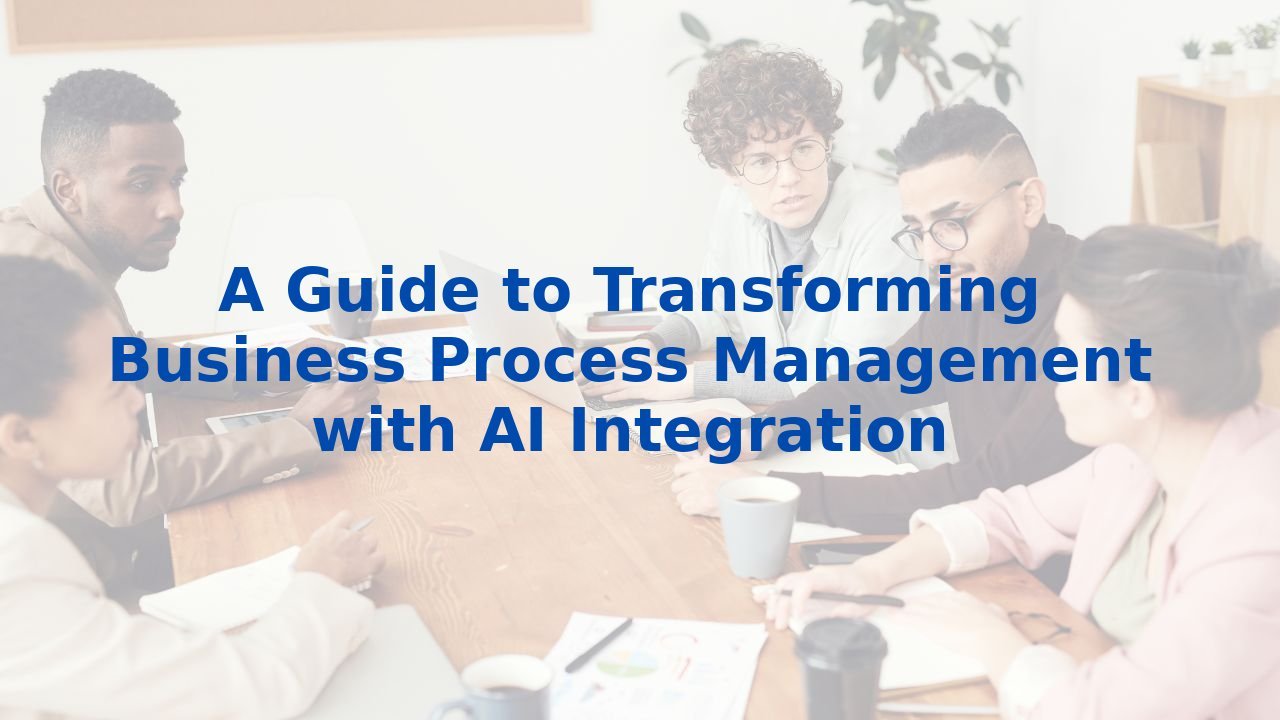A Guide to Transforming Business Process Management with AI Integration
A Guide to Transforming Business Process Management with AI Integration
In today's fast-paced business world, the ability to adapt and optimize is not just an advantage; it's a necessity. Business Process Management (BPM) serves as the bedrock for organizations aiming to streamline operations, yet the infusion of Artificial Intelligence (AI) is redefining what efficiency looks like. Let’s dive into how AI integration can transform various business processes and amplify organizational effectiveness.
Enhancing Front-Office Processes
The front office is where the magic happens—sales, customer interactions, and initial employee engagement. Here, AI makes strides by automating trivial tasks, allowing human talent to focus on higher-value contributions. Imagine an AI-powered chatbot, ready to handle customer inquiries or guide employees through necessary procedures. Through real-time assistance, these systems analyze unstructured data sources, such as customer feedback and social media chatter, amplifying customer satisfaction and engagement.
Business Process Mapping and Analysis
Historically, mapping business processes was a labor-intensive exercise, fraught with potential for human error. Enter AI and machine learning. Now, intricate business processes can be automatically mapped, identifying areas ripe for improvement. Real-time monitoring of production lines can highlight bottlenecks before they escalate, proving invaluable for productivity. This methodology not only accelerates business process analysis but enriches modeling and risk management, leading to outcomes previously thought unreachable.
The Role of Chatbots, Virtual Assistants, and NLP
Chatbots and virtual assistants are becoming the backbone of modern BPM systems, empowered by generative AI and natural language processing (NLP). These tools navigate customer inquiries seamlessly while enriching data processing capabilities. With NLP's power to decode unstructured data, organizations can unearth insights from customer feedback, shaping a proactive approach to service delivery and strategy refinement.
The Benefits of AI in BPM
AI's ripple effect through BPM is profound, and benefits abound:
- Efficiency and Automation: Task automation liberates human resources to elevate complex endeavors, driving productivity sky-high.
- Data Analysis: AI rapidly processes extensive datasets, unearthing patterns that empower remarkable decision-making.
- Risk Management: Early detection of data discrepancies equips companies to manage risks effectively, minimizing costly repercussions.
- Customer Experience: By evaluating customer sentiments and behavioral trends, AI paves the way for enriched service interactions, reduce wait times, and optimize customer routing.
Process Simulation and Optimization
AI's capacity to simulate processes stretches the boundaries of informed decision-making. Leveraging historical data, machine learning algorithms uncover patterns and dependencies. This simulation enables companies to forecast performance metrics and pinpoint bottlenecks, laying the groundwork for data-driven strategy adjustments without real-world repercussions. It's a new frontier in process optimization—one where flexibility thrives.
Real-Time Monitoring and Process Mining
Imagine having a real-time view into your operational processes. AI-enabled process mining grants just that, delivering current insights that allow immediate intervention for emerging issues. Detecting anomalies in workflow ensures problems are addressed before they spiral out of control. With AI’s ability to recommend optimization strategies, organizations can foster an environment of continuous improvement, always tuned to the evolving landscape.
The Importance of Training Employees for AI
While the technical capabilities of AI are transformative, human factors remain paramount. Training employees to effectively engage with AI is as crucial as the technology itself. Here are some essential training focus areas:
- Understanding AI Capabilities: By comprehending AI's strengths and limitations, employees can harness its potential fully.
- Collaborative Work: Teaching how to partner with AI systems can elevate human capabilities, leading to truly synergistic outcomes.
- Data Interpretation: Equipping employees with skills to translate AI-derived insights into actionable strategies will take decision-making to new heights.
Conclusion
As we navigate the intersection of AI and Business Process Management, it’s clear that the stakes are higher than ever. The power of AI lies not in replacing human talent, but in enhancing it—driving organizations toward remarkable efficiency and effectiveness. Investing in both technology and employee training can unlock a potential that far exceeds our current understanding. If your organization is set to ride this wave, consider the opportunities that come with tailored AI training for your entire workforce to realize these benefits fully.
In an era where efficiency meets innovation, the organizations that adapt will lead the charge toward a brighter future.



